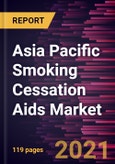According to a new market research study of “Asia Pacific Smoking Cessation Aids Market Forecast to 2028 - COVID-19 Impact and Regional Analysis by Product, End-user and Country.” The Asia Pacific smoking cessation aids market is expected to reach US$ 14,753.04 million by 2028 from US$ 5,015.08 million in 2021; it is estimated to grow at a CAGR of 16.7% from 2021 to 2028. The report highlights trends prevailing in the Asia Pacific smoking cessation aids market and the factors driving market along with those that act as hindrances. Key factors that are driving the growth of this market are rising addiction toward tobacco smoking and increasing number of campaigns to reduce smoking and tobacco dependence. However, steeping costs for development of nicotine replacement therapies are likely to restrain the market growth in the future years to some extent.
The huge patient population in developing countries of Asia Pacific is generating demand for new products and therapies for smoking cessation. In addition, Southeast Asian countries has one of the highest smoking populations in the world. The population can lead to the high incidence of chronic diseases in Asia Pacific, which is a key factor increasing the number of clinical trials in Asia. Thus, the introduction of new smoking cessation products in terms of therapeutic and medical device aids in the emerging economies is likely to provide significant growth opportunities to players involved in the global smoking cessation aids market in coming years. The number of clinical trials conducted in Asia Pacific is more than those in the US or Europe owing to low operational costs, large patient recruitment potential, contract research organizations growth, favourable regulatory environment, and better clinical trials capacity and quality. The substance and tobacco abuse treatment industry are getting competitive every consecutive year with the introduction of new and innovative therapies by the market players for smoking cessation aids. In addition, medical devices such as nicotine-free e-cigarettes and vapes are being launched by market players at local and regional levels. Thus, the consistent launch of new and innovative smoking cessation aids would become a prevalent trend in the smoking cessation aids market in the coming years.
Asia Pacific countries are expecting to witness a huge challenge due to the outbreak of COVID-19. Restrictive measures such as central lockdown and trade limitations have been taken to control the spread of COVID-19. The world health organization (WHO) have been evaluating new research constantly, and it states that there is a positive relation between tobacco use and nicotine use, helping COVID-19 patients to get well. For increasing risk for COVID-19, smoking is the major cause of underlying health conditions. However, there is currently insufficient information to confirm any link between tobacco or nicotine in the prevention or treatment of COVID-19. Hence, the impact of the COVID-19 pandemic on smoking cessation aids market is low in the Asia Pacific region.
The Asia Pacific smoking cessation aids market, by product, is segmented into nicotine replacement therapy, drugs, electronic cigarettes, and others. Based on End-user, the Asia Pacific smoking cessation aids market is segmented into hospital pharmacies, online channel, retail pharmacies, and other End-users. Geographically, the Asia Pacific smoking cessation aids market cab be bifurcated into China, Japan, India, Australia, South Korea and Rest of Asia Pacific.
Pfizer Inc. GlaxoSmithKline plc. Dr. Reddy's Laboratories, Johnson and Johnson Services, Inc. Cipla Inc. Perrigo Company plc, Bausch Health Companies Inc. and Glenmark are among the leading companies operating in the Asia Pacific smoking cessation aids market
Reasons to buy:
- Save and reduce time carrying out entry-level research by identifying the growth, size, leading players and segments in the Asia Pacific smoking cessation aids market
- Highlights key business priorities in order to assist companies to realign their business strategies
- The key findings and recommendations highlight crucial progressive industry trends in the Asia Pacific smoking cessation aids market, thereby allowing players across the value chain to develop effective long-term strategies
- Develop/modify business expansion plans by using substantial growth offering developed and emerging markets
- Scrutinize in-depth market trends and outlook coupled with the factors driving the market, as well as those hindering it
- Enhance the decision-making process by understanding the strategies that underpin security interest with respect to client products, segmentation, pricing and distribution.
Table of Contents
Companies Mentioned
- Pfizer Inc.
- GlaxoSmithKline plc.
- Dr. Reddy's Laboratories
- Johnson and Johnson Services, Inc.
- Cipla Inc.
- Perrigo Company plc
- Bausch Health Companies Inc.
- Glenmark
Table Information
| Report Attribute | Details |
|---|---|
| No. of Pages | 119 |
| Published | August 2021 |
| Forecast Period | 2021 - 2028 |
| Estimated Market Value ( USD | $ 5015.08 Million |
| Forecasted Market Value ( USD | $ 14753.04 Million |
| Compound Annual Growth Rate | 16.7% |
| Regions Covered | Asia Pacific |
| No. of Companies Mentioned | 8 |









